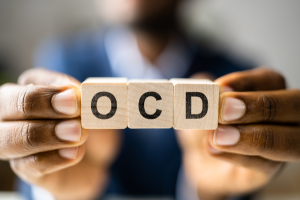OCD Treatment

OCD Treatment at Manoshanti Neuropsychiatry Clinic
Obsessive-Compulsive Disorder (OCD) is a mental health condition that affects millions of people worldwide. It is characterized by uncontrollable, recurring thoughts (obsessions) and repetitive behaviors (compulsions) that the individual feels compelled to perform. At Manoshanti Neuropsychiatry Clinic, we understand the impact OCD can have on your daily life, relationships, and overall well-being. Our dedicated team of mental health professionals provides compassionate care and effective treatment to help you manage and overcome OCD.
What is OCD?
Obsessive-Compulsive Disorder (OCD) is a chronic condition that involves unwanted and intrusive thoughts (obsessions) that lead to repetitive actions (compulsions). The compulsive behaviors are usually carried out in an attempt to reduce the anxiety caused by these obsessions. These thoughts and actions can interfere with daily life, affecting work, relationships, and overall functioning.
Common Symptoms of OCD:
- Obsessions: Persistent, intrusive thoughts, images, or urges that cause distress. These may include fears of contamination, harm, or making a mistake.
- Compulsions: Repetitive behaviors or mental acts that individuals feel compelled to perform to relieve the anxiety caused by their obsessions. Common compulsions include washing, checking, counting, or arranging things in a specific order.
Some common signs of OCD include:
- Spending a significant amount of time on rituals or repetitive behaviors
- Feeling distressed or anxious about specific thoughts or actions
- Engaging in actions to prevent a feared event or situation (such as repeatedly checking locks or washing hands)
- Avoiding situations that may trigger obsessive thoughts or compulsions
- Having difficulty completing tasks due to time spent on rituals
Why OCD Treatment is Important:
Left untreated, OCD can severely impact a person’s life, leading to:
- Impaired Daily Functioning: OCD can disrupt work, school, and social activities, causing difficulties in meeting responsibilities.
- Emotional Distress: The constant battle between obsessions and compulsions can lead to anxiety, depression, and feelings of helplessness.
- Relationship Strain: OCD can create misunderstandings and tension in relationships due to time-consuming rituals or avoidance behaviors.
- Physical Health Issues: Compulsive behaviors, such as excessive washing or cleaning, can lead to skin damage or physical exhaustion.
Our Comprehensive OCD Treatment Approach:
At Manoshanti Neuropsychiatry Clinic, we offer a range of evidence-based treatments tailored to help individuals manage and reduce OCD symptoms. Our team of specialists is committed to providing personalized care that addresses both the psychological and emotional aspects of the condition.
1. Cognitive Behavioral Therapy (CBT):
Cognitive Behavioral Therapy (CBT) is the most effective treatment for OCD. CBT helps individuals challenge and change the negative thought patterns that drive compulsions. The most commonly used form of CBT for OCD is Exposure and Response Prevention (ERP). ERP involves exposing patients to feared situations or thoughts while preventing the compulsion, gradually helping them tolerate the anxiety and reduce the need for rituals.
2. Medication:
In some cases, medication can be an important part of the treatment for OCD. Selective serotonin reuptake inhibitors (SSRIs), a class of antidepressant medications, have been shown to help reduce the frequency and intensity of obsessions and compulsions. Our psychiatrists work closely with patients to determine the best medication plan, based on individual needs and responses.
3. Mindfulness and Relaxation Techniques:
Mindfulness practices, such as meditation and deep breathing exercises, are incorporated into our treatment plans to help individuals manage stress and anxiety related to OCD. These techniques teach individuals to accept and let go of obsessive thoughts without acting on them.
4. Family Therapy:
Family members play an essential role in supporting someone with OCD. Our clinic offers family therapy to educate loved ones about OCD, improve understanding, and foster a supportive environment for the individual undergoing treatment.
5. Support Groups:
Support groups offer a valuable opportunity for individuals with OCD to connect with others who understand their struggles. Sharing experiences and coping strategies in a group setting can provide encouragement and reduce feelings of isolation.
6. Long-Term Support and Relapse Prevention:
Recovery from OCD is an ongoing process. We provide long-term support and relapse prevention strategies to help patients maintain their progress and manage any setbacks. Our team is available for regular follow-ups to monitor progress and adjust treatment plans as needed.
Why Choose Manoshanti Neuropsychiatry Clinic?
- Experienced and Compassionate Team: Our team of psychiatrists, psychologists, and therapists specialize in treating OCD and are dedicated to providing effective and compassionate care.
- Personalized Treatment Plans: We understand that every person is unique, which is why we tailor treatment plans to meet the specific needs of each patient.
- Holistic Approach: We take a comprehensive approach to treatment, addressing the emotional, psychological, and physical aspects of OCD.
- Confidential and Supportive Environment: We provide a safe and non-judgmental space for individuals to work through their challenges and find healing.
Take the First Step Towards Managing OCD:
If you or a loved one is struggling with OCD, Manoshanti Neuropsychiatry Clinic is here to help. Recovery is possible, and with the right support and treatment, you can lead a fulfilling life free from the constraints of OCD.
